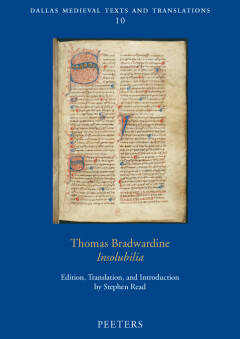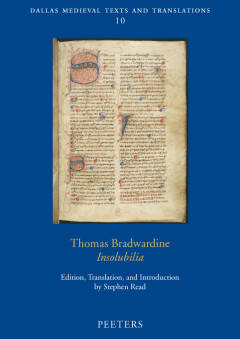
Bedankt voor het vertrouwen het afgelopen jaar! Om jou te bedanken bieden we GRATIS verzending (in België) aan op alles gedurende de hele maand januari.
- Afhalen na 1 uur in een winkel met voorraad
- In januari gratis thuislevering in België
- Ruim aanbod met 7 miljoen producten
Bedankt voor het vertrouwen het afgelopen jaar! Om jou te bedanken bieden we GRATIS verzending (in België) aan op alles gedurende de hele maand januari.
- Afhalen na 1 uur in een winkel met voorraad
- In januari gratis thuislevering in België
- Ruim aanbod met 7 miljoen producten
Zoeken
Omschrijving
The fourteenth-century thinker Thomas Bradwardine is well known in both the history of science and the history of theology. The first of the Merton Calculators (mathematical physicists) and passionate defender of the Augustinian doctrine of salvation through grace alone, he was briefly archbishop of Canterbury before succumbing to the Black Death in 1349. This new edition of his Insolubilia, made from all thirteen known manuscripts, shows that he was also a logician of the first rank. The edition is accompanied by a full English translation. In the treatise, Bradwardine considers and rejects the theories of his contemporaries about the logical puzzles known as "insolubles," and sets out his own solution at length and in detail. In a substantial introduction, Stephen Read describes Bradwardine's analysis, compares it with other more recent theories, and places it in its historical context. The text is accompanied by three appendices, the first of which is an extra chapter found in two manuscripts (and partly in a third) that appears to contain further thoughts by Bradwardine himself. The second contains an extract from Ralph Strode's Insolubilia, composed in the 1360s, repeating and enlarging on Bradwardine's text; and the third consists of an anonymous text that applies Bradwardine's solution to a succession of different insolubles.
Specificaties
Betrokkenen
- Auteur(s):
- Uitgeverij:
Inhoud
- Aantal bladzijden:
- 236
- Taal:
- Engels
- Reeks:
- Reeksnummer:
- nr. 10
Eigenschappen
- Productcode (EAN):
- 9789042923171
- Verschijningsdatum:
- 7/05/2010
- Uitvoering:
- Paperback
- Formaat:
- Trade paperback (VS)
- Afmetingen:
- 170 mm x 236 mm
- Gewicht:
- 612 g

Alleen bij Standaard Boekhandel
+ 166 punten op je klantenkaart van Standaard Boekhandel
Beoordelingen
We publiceren alleen reviews die voldoen aan de voorwaarden voor reviews. Bekijk onze voorwaarden voor reviews.









